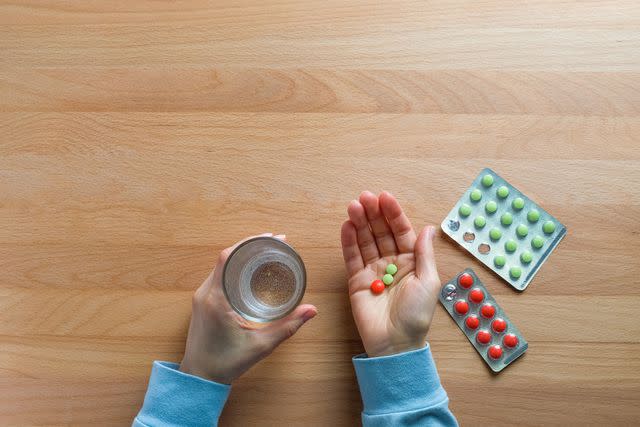FDA Panel Says a Common Cold Medicines’ Decongestant Does Not Work, Here's Why
"We really should not have products on the market that are not effective," a panel committee member said of phenylephrine

getty
PharmacyIf you’ve found that lately you still feel stuffy after taking a decongestant, there could be a valid reason as to why.
On Tuesday, a Food and Drug Administration (FDA) advisory panel released new findings that revealed one of the key ingredients found in many over-the-counter health products doesn’t relieve congested individuals of the issue after all.
Related: FDA Warns Against TikTok Videos Encouraging People to Cook Chicken in NyQuil: 'Very Unsafe'
Phenylephrine — which is commonly found in over-the-counter medications used to treat nasal congestion — is now considered ineffective. The ingredient was marketed as a decongestant used to treat stuffy noses, sinus congestion and pressure.
It was also previously believed to reduce swelling of blood vessels in nasal passages.
"It has poor oral bioavailability because of extensive first-pass metabolism in the gut and liver," The Journal of Allergy and Clinical Immunology reports.

getty
Cold MedicineThe findings were unanimously determined after a vote was held and the revelation could reshape the billion-dollar over-the-counter healthcare industry as we know it, NBC News reported.
According to The New York Times, the FDA will likely have to make the decision on whether to remove the ineffective products or ban them. The outlet noted that the process could take months, even longer if the results are contested.
For the United States, some of the most commonly used brands that list phenylephrine as the active ingredient include Sudafed PE, Vicks Nyquil Sinex Nighttime Sinus Relief and Benadryl Allergy Plus Congestion.
Never miss a story — sign up for PEOPLE's free daily newsletter to stay up-to-date on the best of what PEOPLE has to offer, from celebrity news to compelling human interest stories.
CNN adds that together, the medications generated almost $1.8 billion last year, citing data that the Nonprescription Drugs Advisory Committee was given on Monday during a two-day meeting.
Susan Blalock, a retired professor at the UNC Eshelman School of Pharmacy in North Carolina, is a member of the committee and spoke out after the information was publicly released.
The evidence is "pretty compelling that this medication is not effective. I don’t think additional data are needed to support that conclusion,” Blalock said.
“I think we clearly have better options in the over-the-counter space to help our patients, and the studies do not support that this is an effective drug,” Maria Coyle, the chairwoman of the panel and an associate professor of pharmacy at Ohio State University, added.
Dr. Leslie Hendeles, a pharmacist from the University of Florida in Gainesville, added, “If you have a stuffy nose and you take this medicine, you will still have a stuffy nose.”
In 2007, the pharmacist and some of her colleagues petitioned for drug companies to stop producing products with phenylephrine.
However, earlier this year, the Consumer Healthcare Products Association agreed with the continued sale of medications with the ingredient.

getty
Pharmacy“Phenylephrine has been used safely and effectively as a nasal decongestant by American families for generations, and FDA regulations recognize it as safe and effective," they said in a statement in March.
In light of Tuesday’s findings, many in the healthcare industry unequivocally disagree.
“We really should not have products on the market that are not effective,” committee member Dr. Diane Ginsburg of the University of Texas at Austin College of Pharmacy said.
NBC News added that when it came to information gathered using two decades of research conducted in five different studies, the results determined that phenylephrine taken orally had no greater effect on subjects than a placebo.
For more People news, make sure to sign up for our newsletter!
Read the original article on People.

